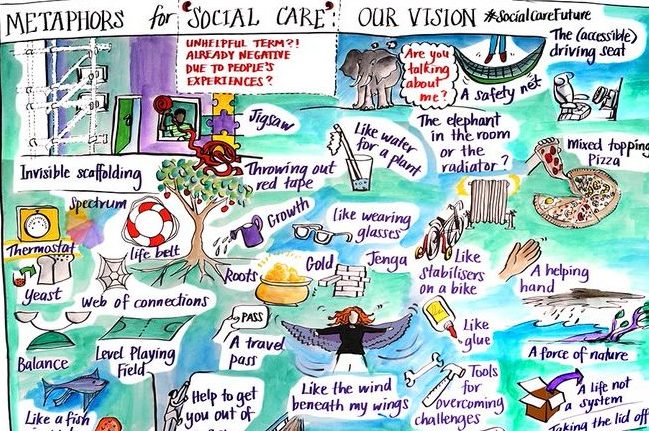
Words have power - choose wisely
Living 200 miles away from my dad who has Alzheimer’s and my mum who has, without much consultation, been reassigned from being his wife to being his ‘carer’, I feel acutely the pressing need for a better social care future.
It would be easy for me to join the chorus of voices calling for government to ‘fix’ the ‘crisis’ in our ‘broken’ social care system. But if I’ve learned one thing over the past several years, it’s that making a crisis out of social care is highly unlikely to help end that crisis.
Repeatedly rehearsing the scale of problems, using metaphors of impending disaster such as the ‘demographic timebomb’ or ‘silver Tsunami’, in the absence of corresponding, viable solutions can see a sense of urgency dissolve into public despondency and fatalism.
Moreover, while there has to be a significant uplift in investment in care and support, it will only be sustainable with a radical shift in how it works and who is involved in producing it, which is is almost wholly absent from the public story.

Changing the narrative
That’s why, with #socialcarefuture and our diverse network, we’re working to produce and begin telling a story to marshal public support for our vision and ideas of how we can create a brighter future together.
As the godfather of framing Professor George Lakoff explains:
‘Frames are mental structures that shape the way we see the world. In politics our frames shape our social policies and the institutions we form to carry out policies. To change our frames is to change all of this. Framing is social change.’
Approaches to care and support that centre on working alongside people as equals to achieve and maintain meaning, purpose and connection are unlikely to thrive where the public framing of social care reduces it to ‘life and limb’ care, doing little more than ‘looking after vulnerable people’.
We will only succeed in moving the kinds of solutions curated and promoted by the Social Care Innovation Network from the margins to the mainstream, when we change public understanding of what care and support does and how it works when it is working well.

Reasons to care
Moreover, we have to find a way to give people, including those not immediately affected, cause to value and care about it.
Research commissioned by #socialcarefuture into how social care was discussed during the 2019 election found that, between 27 October - 14 December 2019, social care tweets amounted to only 5% of the number concerning the NHS and just 2.5% of those concerning Brexit.
If we set our minds to it, we can build world-class approaches to supporting people across the life course, just as we can choose high-speed rail, or full-fibre broadband. But we have to make people believe it's possible. As the American communications expert Anat Shenker-Osorio has pointed out, Martin Luther King never gave an ‘I have a complaint’ speech.
We all want to live in the place we call home with the people and things that we love, doing what matters to us in communities where we look out for one another. Everyone has reason to value approaches that helps us to maintain or secure this vision.
The building blocks for achieving it are with us, they’re just not evenly distributed. Our desire to bring that future vision forward is why we have started work on changing how people talk about, think about and feel about social care.
Find out more about #socialcarefuture’s work to tell a better story here
2 comments
Comment by Stella posted on
Yes, but those of us working in social care are increasingly unable to give the personalised service that clients need and deserve because of government cuts to funding. And interesting that you use a photo of a high speed train when the gov have just approved the billions it will cost for HS2 when the negatives (eg environmental & funding necessary for good social care) far outweigh the positives. I also, as most in carework, work at a wage that barely keeps up with the cost of living and this year will have to pay more council tax to support social care deficits from gov- so paying out even more which makes my wages less and less= the stress we workers are under dealing with an emotional and physically challenging job just gets worse.
Comment by Sheila Cole posted on
Can I just agree & add to the above. I have worked in social care for over 35years. As the older population has grown I have found the respect for the caring profession has decreased massively. This is shown in poorer training, Lower income & general attitude towards carers. Unskilled we certainly are not but until we change those things & care is seen as a respected valuable role then our vulnerable people will continue to be put at risk. Recruitment will continue to fall.